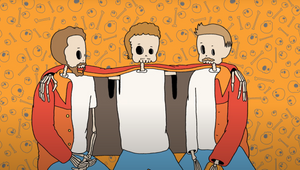
“AI Allows the Unremarkable to Do the Remarkable”

Discussions of AI’s looming effects are reverberating across our industry. We already know that some creatives are turning to Dall-E and ChatGPT to spitball ideas and make the blank page less daunting. While that all sounds pretty tame on the surface, there are some pretty serious implications to consider. Music is the least discussed area in relation to AI and yet it’s potentially in danger too, just like other parts of the creative ecosystem. A few months ago, we asked music pros to review some AI-generated tracks, assessing their quality. The responses were amusing and damning, with a good dose of exasperation thrown in for good measure.
For Simon Elms, director and composer at Eclectic Music and Bark Soho, the glaring issue around the use of AI in general is that it “allows the unremarkable to do the remarkable…..at least initially.”
“AI is often a shortcut. The world is obsessed with shortcuts. It allows people to do something that’s difficult much more easily, which is fine as long as it’s part of some original work. It can’t just be ‘the thing’. The effect of AI is a bit like quantitative easing. Print a load of new money and the value of your currency has the potential to go down the toilet. If a copywriter is relying on ChatGPT then they probably shouldn’t be a copywriter. Musicians and composers don’t go into music because it’s easy. They’re not interested in taking shortcuts. They love the detail. Each week they sacrifice hours of their free time in the pursuit of perfection, developing a voice, being original. That’s what makes life joyful. The elephant in the room with AI is this: is it something that will help us elevate our ideas - a tool to polish or the icing on the cake - or is it a cost cutting exercise?”
“The music industry has been decimated by new technology for years which has resulted in thousands of musicians being underemployed and what feels like 90% of the big recording studios going out of business. The upside of this tech onslaught is that it’s democratised music - that is you don’t necessarily have to have a formal classical music education or even learn to play an instrument to engage or be engaged in the music business. Millions of kids the world over are producing phenomenal music in their bedrooms, and that’s a good thing. But, when this tech tomfoolery is used unimaginatively, or it enables individuals who are just not that talented, to write music, the results are endless hours of bland soundalikes. AI may allow us to mimic, but it needs humans to create something to mimic…it’s a chicken and/or egg situation,” Simon adds. It’s the rarity of true expertise that makes it stand out in a sea of blandness and mediocrity but AI scrapes what genius has created through practice, sacrifice, and even the mistakes - and calls it its own. The process devalues what makes great music, and by extension all art, remarkable, flattering everything under the drab ‘content’ moniker.
Markus Ffitch, sound designer at Bark Soho and Eclectic, recalls a story of the actor Ian McKellen who, during the gruelling VFX-fuelled production for The Hobbit was subjected to so many scenes of green screen, that he broke down into tears. "It's not what I do for a living. I act with other people, I don't act on my own,” he said as reported in The Guardian. Markus sees a parallel to what’s happening in the industry as AI infiltrates. “In a few years our job may end up looking very different than it does now. And that’s not inherently a bad thing but if it robs us of human collaboration and ingenuity we will all suffer for it. The magic happens when we are all in a room together, creative sparks are flying and we are taking things in new and unexpected directions. Mistakes and accidents are amazing for creativity. I can’t see the same thing happening whilst asking a bot to do the work for us.”
“It’s not to say the tools are not phenomenal. We have been using AI for years. It can clean up audio or separate instruments in the most remarkable ways. But it’s starting to take on a different persona with Chat GPT. We are all starting to finally see a glimpse of HAL 9000 - this faceless entity that is semi-self-aware who can do everything that we can ten times as fast,” he adds.
For Markus, the danger lies in some people starting to think it's all easy. “There’s a well known phenomena called the Dunning-Kruger effect. It means that when you have a little bit of knowledge, you tend to overestimate your expertise. Yet the more you learn the more humbled you are,” he explains.

"Will people soon be making films by typing in prompts like, ‘Make me a film about a man and his dog and stick a logo on the end please, oh and the dog should sound like an elephant’?,” Markus wonders.
“Maybe I’m just comfortably perched atop Mount Stupid but there’s a reason people still buy things that are made by hand. I’m quietly confident,” he says. “Originality resonates with the public. If one relies heavily on AI to get the creative juices flowing then I think that originality is threatened. Some of the tools available are fantastic but let them remain a tool. Let’s not let it wedge its way into the creative process. Leave that to the humans.” In the hands of companies with ever-hungrier profit motives, AI can become a way of stripping out all that’s good about creativity, collaboration, and human connection in service of the bottom line.















